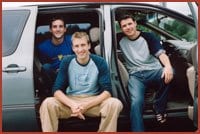High school is hell, and the experience is even worse for gay, lesbian and trans youth. Homophobic bullying is often so devastating that it drives many queer young people to leave school and sometimes causes them to attempt suicide. Many of them will require years of therapy to get over the trauma of coming out at school.
Sound grim? Well, that’s the way that many school counsellors, teachers and youth advocates describe the experiences of queer youth, and they have the statistics and anecdotal data to prove it. But Benjie Nycum is determined to change the way our community perceives and treats our youth. If he had his way, queer teens would be described this way: “a sea of innovators, of motivators, of creators of positive change: the power centre of the future planet.”
Nycum is one of the cofounders of Young Gay America, a project that saw him and two friends drive across Canada and the United States, interviewing over 1,500 queer teens about the experience of coming out and coping in high school. At a workshop at the recent Outgames human rights conference in Montreal, he shattered the myth that queer youth are simply victims of circumstance and oppression. Instead, he encouraged the audience to think of gay teens as “resilient… full of compassion, empathy and insight. Capable of strategic thinking and possessing new and flexible concepts of identity.”
While Nycum’s perception of queer youth bucks the trend, he also doesn’t deny that gay and trans teens are struggling all over the world. According to the International Gay and Lesbian Association (ILGA), sexual minority status is one of the key “indicators” of adolescent suicide. A 2002 study found that trans adults were more likely to have suicidal thoughts and make suicide attempts than non-trans people, regardless of their sexual orientation.
The question is, how do we reach out to queer youth and play to their strengths? How do we use the disturbing data to transform the way we work with gay teens?
For researchers at ILGA Europe, the first step was to gather the evidence. As Evelyne Paradis explained at the Outgames conference, the organization surveyed youth all over Europe, distributing a questionnaire in 17 languages that asked queer youth to describe their experiences of social exclusion. Within three months, they received 754 responses, from gay and trans teens in 34 European countries. The stories of discrimination were widespread, and weren’t confined to the former Soviet states and others with less progressive laws. In fact, some of the more striking accounts came from teens in countries like Denmark and Sweden, with liberal laws and less social stigma attached to homosexuality.
In the midst of hundreds of hours of interviews with queer teens, Nycum also heard many stories of bullying and discrimination. But he also saw tremendous hope for the future. When he initially set out on his travels, armed with mountains of data about gay youth, he was surprised at what he found — hundreds of relatively well-adjusted teens that were channeling their experiences of hardship into positive change.
Admitting that he’s been “slammed” at similar conferences for painting such a rosy picture of queer youth, Nycum couldn’t contain his optimism: “queer youth are increasingly a normal part of teenage life, and are influencing their peers and building straight allies. By virtue of their every increasing ‘outness’ they are pre-empting the learning of homophobia and hate among peers; slowly creating the ideal world for which queer adults have been fighting since our movement began. They are building to a critical mass in our schools and communities, and they are changing the social landscape one ally at a time.”
Krin Zook from the Toronto Children’s Aid Society’s Out Program, described how her agency partnered with Planned Parenthood to train youth advocates to deliver antidiscrimination workshops in group homes and residential facilities. She said that one of the agency’s future goals is to train youth who have been through the foster care system to take on this role, so they can help combat bullying and discrimination and prevent queer youth from leaving “the system” and ending up on the street.
This is the kind of program that excites Nycum.
“I find we sell [queer youth] short by only highlighting their struggles and hardships in an endeavor to raise awareness of the difficulties they face. We need to be very careful not to pathologize [queer] youth as victims. Call ourselves victims enough and we internalize and become just that. Offer them group therapy only and nothing else, and they define themselves as only needing therapy. Ask them survey questions only about the kinds of abuse they receive, and abuse becomes a defining identity.”
For Nycum, queer youth could be better defined “outgoing leaders whom others follow.” Kind of like him.


 Why you can trust Xtra
Why you can trust Xtra


